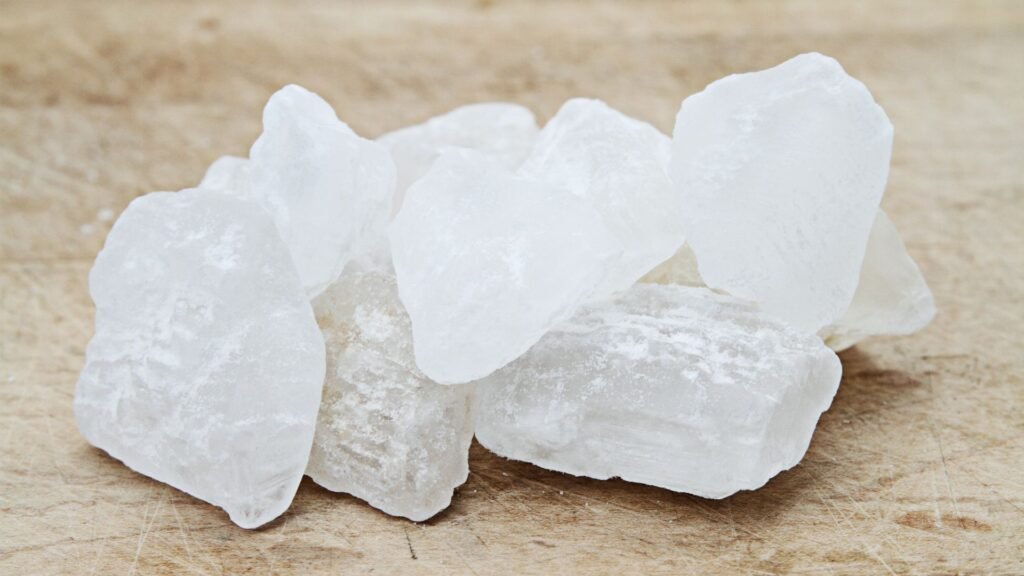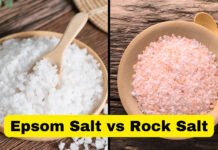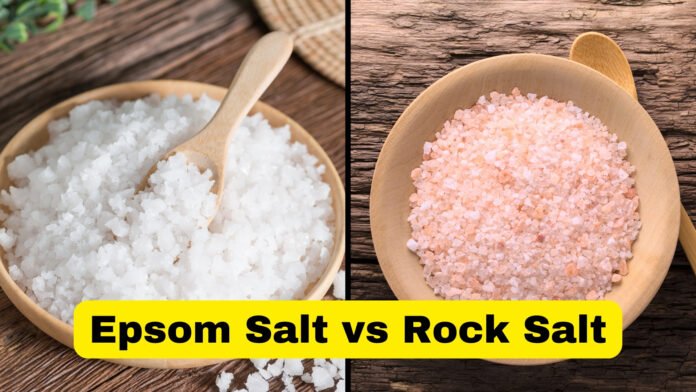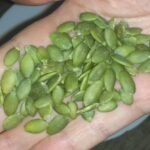Epsom Salt vs Rock Salt: Introduction
Have you ever wondered what the difference is between Epsom salt and rock salt? At first glance, they may seem similar as both are commonly used in spa treatments. However, these common bath salts have some key distinctions beyond just their names. As an avid experimenter of relaxation and wellness techniques, I was curious to learn more about the differences between these salts beyond superficial attributes.
Through my research, I discovered fascinating details about their composition, origins, and unique health benefits that set them apart from one another. In this post, I plan to unveil the unique properties of Epsom salt vs rock salt so you can make an informed decision about which type may better serve your wellness goals. My aim is that after reading you will have a clearer understanding of how these salts differ and when each variety is most appropriately used.
What is Epsom Salt?

Epsom salt, scientifically known as Magnesium Sulfate, is a mineral compound that has been used for centuries for various health and wellness applications. The name hails from the town of Epsom in Surrey, England, where the compound was first distilled from water.
One of the primary benefits of Epsom salt is its high magnesium content. Magnesium plays an essential role in numerous bodily functions, including muscle and nerve function, blood glucose control, and energy production. Soaking in an Epsom salt bath can help replenish your body’s magnesium levels, promote relaxation, and alleviate muscle soreness.
What is Rock Salt?

Rock salt, on the other hand, is a coarse form of salt, also known as Halite, that is mined from underground deposits. Unlike Epsom salt, rock salt mainly consists of Sodium Chloride. It is commonly used for de-icing roads in winter and as a seasoning in cooking.
Rock salt does not provide the same health benefits as Epsom salt. However, it serves crucial functions in maintaining the electrolyte balance in our bodies and plays a vital role in nerve and muscle function.
Epsom Salt vs Rock Salt: The Differences
Although both Epsom salt and rock salt have their unique benefits, there are key differences between the two.
Composition
Epsom salt is a mineral compound comprised of magnesium, sulfur, and oxygen, while rock salt is primarily composed of Sodium Chloride.
Origin
Epsom salt derives its name from the town of Epsom in Surrey, England, where it was first distilled from water. Rock salt, conversely, is mined from underground salt deposits.
Health Benefits
Epsom salt offers health benefits such as promoting relaxation, alleviating muscle soreness, and replenishing the body’s magnesium levels. Rock salt does not provide the same therapeutic benefits but plays a crucial role in maintaining electrolyte balance in the body.
Uses
Epsom salt is used for health and wellness purposes, while rock salt is typically used for culinary purposes and de-icing roads.
Taste
Epsom salt has a bitter taste, making it unsuitable for consumption. Rock salt, on the other hand, is commonly used in cooking due to its salty flavor.
Solubility
Epsom salt is highly soluble in water, which makes it ideal for use in baths or foot soaks. Rock salt is less soluble.
Edibility
While both salts are technically edible, Epsom salt is generally not recommended for ingestion unless under medical supervision. Rock salt can be safely consumed in moderation.
Hydration
Epsom salt is hydrating thanks to the presence of magnesium, whereas rock salt does not have the same hydrating benefits.
Bathing Benefits
Taking a bath with Epsom salt can help soothe muscles, promote relaxation, and replenish magnesium levels in the body. Rock salt does not offer these specific benefits.
Skin Health
Epsom salt is often used in skincare routines for its exfoliating properties and ability to soothe skin irritations. Rock salt does not typically serve this purpose.
Plant Health
Epsom salt is beneficial for plant health as it can improve flower blooming and enhance a plant’s green color. Rock salt can be detrimental to plants and soil health.
Purity
Epsom salt, when in its pure form, does not contain sodium. Rock salt, however, contains both sodium and chloride.
Texture
Epsom salt typically has a finer texture, making it ideal for beauty applications. Rock salt has a coarser texture.
Shelf Life
Epsom salt has an indefinite shelf life if kept dry and properly stored. Rock salt also has a long shelf life but can clump together if exposed to moisture.
Wrapping Up
In conclusion, while both Epsom salt and rock salt serve different purposes, they each have their unique benefits. Remember, knowledge is power, and understanding these differences can help you make informed decisions about your health and well-being. Stay healthy, stay motivated!
Sources:













